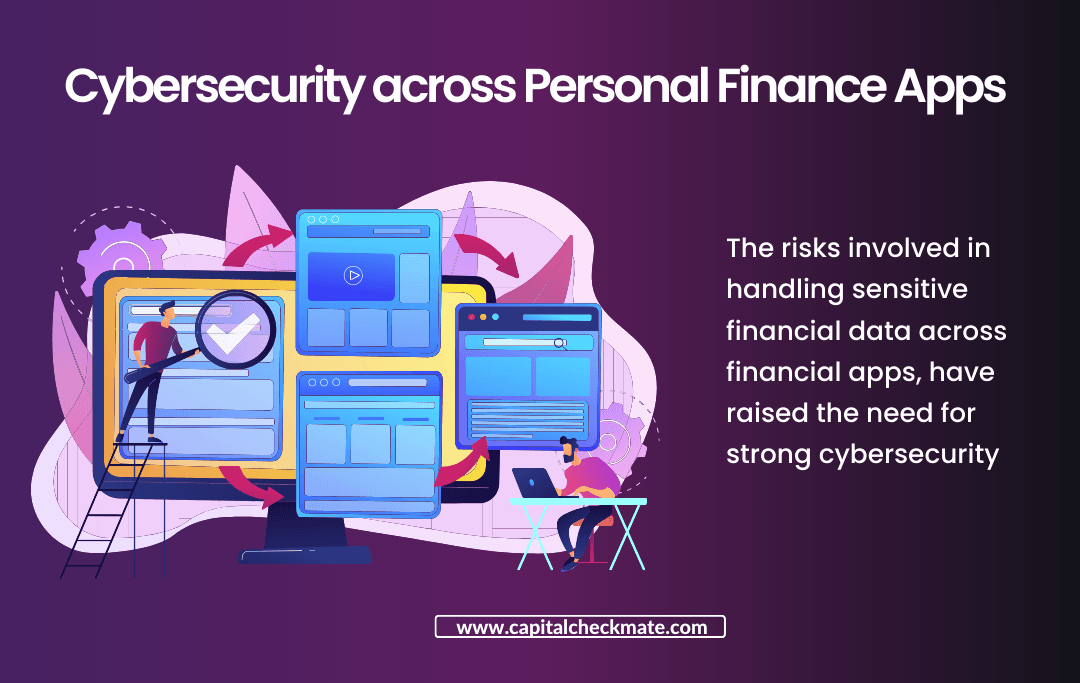Cybersecurity across Personal Finance Apps
In an era where technology seamlessly integrates into every aspect of our lives, personal finance apps have become an essential tool for managing one’s own finances. These apps provide users with convenience and efficiency to manage their finances, monitor their accounts, make & track expenses with a single tap on their smartphones. However, along with this convenience comes a pressing concern for the need of increased cybersecurity to protect sensitive financial information.
Strong cybersecurity is more important than ever in today’s time when personal finance apps and digital transactions are reforming the banking industry. The risks involved in handling sensitive financial data such as details of bank accounts, credit cards, passwords can lead to financial fraud & identity theft. Which is why cybersecurity is becoming increasingly important in the context of personal finance.
Apps for personal finance are now essential tools for handling transactions, investments, and budgets. But along with their convenience comes a greater susceptibility to online attacks. The risks are great, from financial fraud to identity theft, which highlights the necessity of strict cybersecurity protocols.
Let’s talk about some of the key concerns that are imposing the need for cybersecurity:
One major concern is data breaches:
Personal finance apps are attractive targets for cybercriminals because they store a wealth of sensitive information. Strengthening encryption protocols and implementing multi-factor authentication are critical steps in protecting these apps from unauthorized access.
Another serious threat is phishing
Cybercriminals frequently pose as legitimate entities over the mails or messages or phone calls, in order to trick users into disclosing sensitive information. Increasing user awareness through education and incorporating advanced email filtering systems are effective strategies for combating phishing threats.
Last but not the least to protect trust and reputation
Users rely on personal finance apps to manage their finances securely. Any security breach or compromise can erode user trust and tarnish the reputation of the app developer. Investing in robust cybersecurity measures demonstrates a commitment to protecting users’ financial information, thereby enhancing the trustworthiness of the app.
Current Scenario of Cybersecurity
Regulatory bodies are becoming more aware of the significance of cybersecurity in the financial sector. Compliance with industry standards and regulations, such as General Data Protection Regulation (GDPR) and Payment card Industry Data Security Standard (PCI DSS), not only protects user data but also fosters confidence in the app’s security infrastructure.
Additionally, cybersecurity has been increasing for mobile banking and contactless payments. To maintain the integrity of these financial tools requires secure coding practices, regular security audits, and timely software updates. Furthermore, biometric authentication adds an additional layer of security, ensuring that only authorized users have access to sensitive financial data.
Future Prospects of Cybersecurity on Personal Finance:
To stay ahead of cybercriminals, app developers and financial institutions must continuously innovate and enhance their cybersecurity measures. Here are some future prospects for cybersecurity in personal finance apps:
Biometric Authentication: Many personal finance apps already offer biometric authentication, such as fingerprint or facial recognition. In the future, we can expect more advanced biometrics like voice and behavioral recognition, providing an additional layer of security.
AI-driven Threat Detection: Artificial intelligence (AI) can play a critical role in identifying and mitigating cybersecurity threats. By analyzing user behavior, AI algorithms can detect anomalies and alert users or administrators of potential security breaches.
Blockchain Technology: Blockchain, the technology behind cryptocurrencies, has the potential to revolutionize security in personal finance apps. Its decentralized and immutable nature can enhance the privacy and integrity of financial transactions, making them less susceptible to hacking or fraud.
As we see an increasing reliance on personal finance apps, the onus is on both developers and users to prioritize cybersecurity. These apps’ seamless integration into our daily lives should not jeopardize the security of our financial information. We can fortify personal finance apps against the rising tide of cyber threats by implementing strong encryption, multi-factor authentication, regular updates, and user education, ensuring a safer and more secure financial future for users worldwide.


